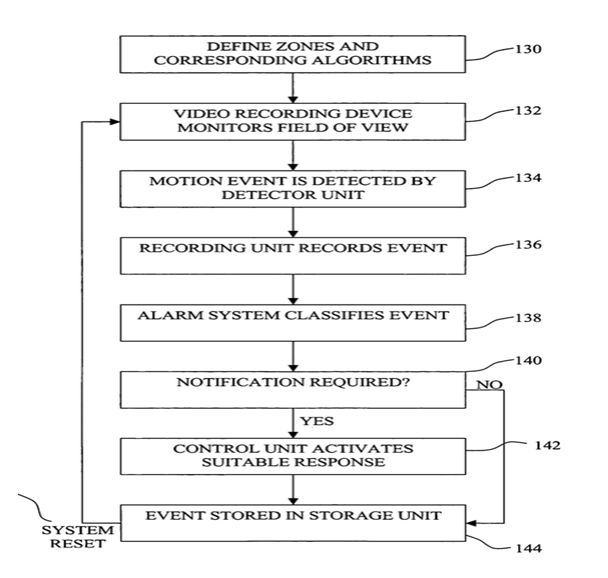德州的CareView Communications, Inc公司在2015年3月19日向德州東區法院泰勒分部遞狀,控告Kincheloe Company d/b/a Perkins Healthcare Technologies涉嫌專利侵權(訴訟基本資訊如表一所示),損害了CareView Communications在2011年12月20日,向專利權人(同時也是發明人) Wael Badawy買來的US7,612,666B2(以影像為基礎的監控系統),這篇專利是在2009年11月3日獲准領證,其中涉及侵權之虞的相關系爭產品,如表二所列。另外,被告也涉嫌在未經授權情況下使用了CareView的產品商標「Virtual Bed Rails」(意指虛擬的床邊護欄)。
表一、本文所述相關訴訟案件資訊
| 訴訟名稱 |
CareView Communications, Inc. v. R.P. Kincheloe Company d/b/a Perkins Healthcare Technologies |
| 提告日期 |
2015/3/19 |
| 原告 |
CareView Communications |
| 被告 |
Kincheloe Company d/b/a Perkins Healthcare Technologies |
| 案號 |
6:15-cv-002225 |
| 訴訟法院 |
德州東區法院泰勒分部 |
| 爭議專利 |
US7,612,666B2 |
| 訴狀下載 |
 |
雙方爭議有兩個部份:(1)至少從2014年開始,被告在販售其產品PatientVision系統時,行銷文宣中就已經使用到Virtual Bed Rails這個註冊商標,例如 “Virtual Bedrails for Patients with High Fall Risk” 或是 “Use preset shapes or freehand drawing to set boundaries to create virtual bed rails and restricted areas”等等說明文字,明顯未經CareView的授權就使用該公司已經註冊的商標事實。不僅會讓消費者產生混淆、誤用,甚至會認為CareView與Perkins之間是否存在聯盟、聯合或贊助等等關係,可能對CareView在銷售產品上造成無法預期的損害;另外,(2) 專利侵權這塊也是指PatientVision這套系統,原告認為這套系統也侵害到US7,612,666B2專利權範圍。這篇專利(如表二所示),基本上,揭露了一個以影像為基礎的監控系統(具備了可記錄特定範圍內影像的裝置),使用者可以直接在裝置中定義需要記錄的區域,每個區域都會由演算法計算該區發生的動作(an algorithm corresponding to movement in that zone),過程中(流程如圖一所示),不論是影像資料的接收或計算動都會由裝置中的處理單元(a processing unit)負責完成。
表二、系爭專利基本資訊
| 專利編號 |
US7,612,666B2 |
| 專利名稱 |
Video Based Monitoring System |
| 申請日期 |
2004年07月27日 |
| 領證日期 |
2009年11月03日 |
| 發明人 |
Wael Badawy (CA) |
| 專利權人(原始) |
Wael Badawy (CA) |
| 專利權人(目前)* |
CareView Communications (US) |
| 技術分類 |
340/541;340/539.25;348/154 |
| 權利項數 |
33 (獨立項4;附屬項29) |
| 被引證數 |
12 |
| 系爭產品 |
PatientVision系統 |
*:發明人於2008年11月4日轉讓給Intelliview Technologies與Cetech Solutions。Intelliview Technologies與Cetech Solutions在2011年9月1日轉讓給Mann Equity Llc;而且,在同一天,Mann Equity Llc又簽約轉讓給CareView Communications。
圖一、概念架構(即US7,612,666B2所附首圖)

一般來說,病人不論是在醫院或是回家休養的初期,都需要經過一段術後恢復的時間。因此,在這段時間裡,就需要醫護人員或家人花費大量時間跟愛心協助照護病人的起居狀況。尤其是指年紀較大的長輩或是其他狀況比較嚴重的病患,往往都需要配置24小時的照護管理,以避免再次發生意外,例如從床上跌落或滑倒可能造成骨折或斷骨危險等等。「Virtual Bed Rails」(意指虛擬的床邊護欄)這套產品的用途即在於此,它可以針對監控系統設定的區域發生的影像進行分析,根據分析的結果判讀是否發生跌倒的狀況繼而自主啟動報警機制。另外,也可以將US7,612,666B2專利揭露的技術內容運用在物理治療的情境中(獨立項內容說明如表三所述),監控、記錄並分析病人在接受物理治療時的動作,包括手或腿的運動方式等等,再將分析結果交由醫生解讀判斷。
表三、US7,612,666B2專利各獨立項內容的概略說明
| 第一獨立項 |
A video-based monitoring system for monitoring an occupant of a room, the monitoring system comprising:(1) a video recording device having a field of view within the room;(2) a processing unit for receiving and processing video data from the video recording device, wherein the processing unit is configured to define plural zones within the field of view of the video recording device, each zone being associated with at least one algorithm, stored in the processing unit, for detecting and classifying a movement of the occupant in the respective zone; and(3) the plural zones correspond at least to a bed zone and a zone within the room outside of the bed that is adjacent to the bed zone;(4) the algorithm associated with the zone adjacent the bed zone being programmed to classify the movement of the occupant in the zone adjacent the bed zone based on the type of movement and movement of the occupant into the zone adjacent the bed zone from the bed zone. |
| 一種以影像為基礎的監控系統,用於監控房間內的人員,監控系統包括:(1) 可監看房間中各視角區域的影像記錄裝置;(2) 處理單元會從影像紀錄裝置接收與處理影像資料,前述處理單元會由影像紀錄裝置組態出具備多個不同視角的區域畫面,每個區域都會關連到一組演算法(儲存在處理單元中,用來偵測辨識特定區域中發生的動作或狀況);(3) 這些可視區域,至少會包含到床舖與其他接連在床舖周圍的區域;(4) 每個區域(包括床舖及床舖周圍)各自都會關連到一組演算法,這些區域的設定是考量到相關人員動作習慣或情境狀態的需要。 |
| 第十四獨立項 |
A method of monitoring the movement of an occupant of a room, the method comprising the steps of:receiving video data from plural zones within the field of view of a sensor, the field of view being within a room, the plural zones including at least a bed zone and a zone outside the bed zone that is adjacent to the bed zone;monitoring the plural zones to detect a movement of an occupant in each zone according to respective motion detection algorithms corresponding to each zone; andclassifying a movement of the occupant in a zone of the plural zones based on the corresponding algorithm, the algorithm associated with the zone adjacent the bed zone being programmed to classify the movement of the occupant in the zone adjacent the bed zone based on the type of movement and movement of the occupant into the zone adjacent the bed zone from the bed zone. |
| [同上述第一項],方法步驟包括:(1) 從各區視角感測器接收影像資料,這些視角分布在房間裡,這麼多區域至少會包括床舖跟床舖週圍相連的區域;(2) 監控多個區域,以便偵測相關人員在各區域的動作,並由各區相應的動作偵測演算法進行偵測;(3) 根據演算法辨識分類相關人員在不同區域的動作,這些演算法都是事先根據相關人員的習慣或情境狀態進行組態,以便判讀在床舖區域與床舖周圍發生的相關動作。 |
| 第31獨立項 |
A method of monitoring the movement of an occupant of a room, the method comprising the steps of:receiving video data from an activity zone of a plurality of zones defined within a field of view of a sensor, the plurality of zones including a bed zone and a door zone, the activity zone being away from the door zone and the bed zone,monitoring the plurality of zones to detect a movement of an occupant in each zone according to respective motion detection algorithms corresponding to each zone; classifying a movement of the occupant in a zone of the plurality of zones based on the corresponding algorithm, the algorithm associated with a zone adjacent the bed zone being programmed to classify the movement of the occupant in the zone adjacent the bed zone based on the type of movement and movement of the occupant into the zone adjacent the bed zone from the bed zone;detecting a movement event of an occupant taking place within the activity zone;tracking at least one property of the movement event, the at least one property comprising:(4-1) a type of movement event, a frequency of movement events, a duration of the movement event, or a time elapsed between movement events; andactivating a response based on the at least one property of the movement event. |
| [同上述第一項],方法步驟包括:(1) 從各區中正發生動作的視角感測器接收影像資料,這些視角分布在房間裡,這麼多視角至少會包括床舖跟床舖週圍相連的區域;(2) 監控多個區域,以便偵測相關人員在各區域的動作,並由各區相應的偵測演算法進行偵測,這些演算法都是事先根據相關人員的習慣或情境狀態進行組態,以便判讀在床舖區域與床舖周圍發生的相關動作;(3) 偵測相關人員在發生動作的視角區域中的動作行為;(4)追蹤至少一動作事件的特性,該至少一特性包含動作事件的型態、頻率、期間或上次發生動作與這次發生的時間差;(5) 根據追蹤的動作啟動相對的回應機制。 |
| 第32獨立項 |
A method of monitoring the movement of an occupant of a room, the method comprising the steps of:receiving video data from a high risk zone of a plurality of zones defined within a field of view of a sensor, the high risk zone containing a danger area, the plurality of zones including a bed zone;monitoring the plurality of zones to detect a movement of an occupant in each zone according to respective motion detection algorithms corresponding to each zone; classifying a movement of the occupant in a zone of the plurality of zones based on the corresponding algorithm, the algorithm associated with a zone adjacent the bed zone being programmed to classify the movement of the occupant in the zone adjacent the bed zone based on the type of movement and movement of the occupant into the zone adjacent the bed zone from the bed zone;detecting a movement event of an occupant taking place within the high-risk zone;tracking movement of an occupant in the high-risk zone, when the movement is either near the danger area or within the danger area; andactivating a response based on the tracking of the movement. |
| [同上述第一項],方法步驟包括:(1) 從各區中風險較高的視角感測器接收影像資料,這些風險較高的區域包括危險區與床舖所在的區域;(2) 監控多個區域,以便偵測相關人員在各區域的動作,並由各區相應的動作偵測演算法進行偵測,這些演算法都是事先根據相關人員的習慣或情境狀態進行組態,以便判讀在床舖區域與床舖周圍發生的相關動作;(3) 偵測在高風險區域中相關人員發生的動作行為;(4) 追蹤高風險區域中相關人員的動作行為,尤其該動作行為發生在危險區域之中或接近(逕參第33權利項)的時候;(5) 根據追蹤的動作啟動相對的回應機制。 |
訴狀中,CareView申訴重點放在商標與專利侵權問題,認為Perkins Healthcare的PatientVision系統不僅銷售文宣中模糊使用到CareView申請的「Virtual Bed Rails」商標,而且該系爭產品具備的技術特徵已侵害到所述的以影像為基礎的監控系統與相關方法(如表三所述)。為了維護其專利權,希望法院在起訴後作出判決前能先簽發初步禁制令,以有效禁止被告實施或繼續其侵權行為,甚至希望法院在確認Perkins Healthcare的專利侵權行為之後,能進一步核發永久禁制令處分,同時也需要賠償CareView因商標與專利侵權導致的財務損失。(2136字;表3)
本網站相關連結:
--------------------------------------------------------------------------------------------------------------------------------------------